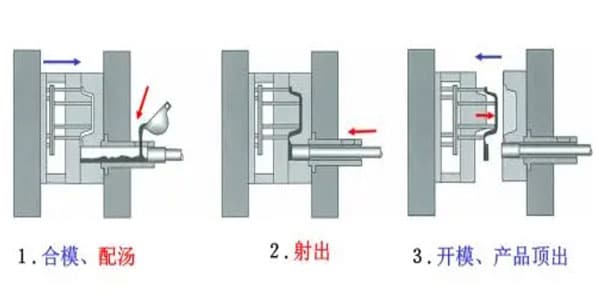The Facts About Alcast Company Revealed
The Facts About Alcast Company Revealed
Blog Article
Our Alcast Company Ideas
Table of ContentsThe smart Trick of Alcast Company That Nobody is DiscussingThe Greatest Guide To Alcast CompanyRumored Buzz on Alcast CompanyThe 8-Second Trick For Alcast CompanyThe Ultimate Guide To Alcast CompanyThe Alcast Company Diaries
The refined difference lies in the chemical material. Chemical Contrast of Cast Light weight aluminum Alloys Silicon promotes castability by decreasing the alloy's melting temperature and enhancing fluidness during spreading. It plays a vital duty in allowing elaborate mold and mildews to be filled accurately. In addition, silicon adds to the alloy's stamina and put on resistance, making it beneficial in applications where longevity is essential, such as vehicle parts and engine elements.It likewise boosts the machinability of the alloy, making it simpler to refine into completed products. In this way, iron adds to the total workability of light weight aluminum alloys. Copper raises electric conductivity, making it beneficial in electric applications. It likewise enhances deterioration resistance and includes to the alloy's overall strength.
Manganese adds to the toughness of aluminum alloys and enhances workability. Magnesium is a light-weight element that provides stamina and effect resistance to light weight aluminum alloys.
All about Alcast Company
It permits the manufacturing of light-weight elements with superb mechanical buildings. Zinc enhances the castability of light weight aluminum alloys and assists control the solidification procedure during spreading. It boosts the alloy's strength and hardness. It is commonly found in applications where intricate shapes and fine information are necessary, such as decorative spreadings and certain vehicle components.

The primary thermal conductivity, tensile stamina, return toughness, and prolongation vary. Select suitable raw materials according to the efficiency of the target product produced. Among the above alloys, A356 has the highest thermal conductivity, and A380 and ADC12 have the cheapest. The tensile limit is the opposite. A360 has the very best yield strength and the highest elongation rate.
Examine This Report about Alcast Company

In precision spreading, 6063 is fit for applications where intricate geometries and top notch surface finishes are paramount. Examples consist of telecommunication units, where the alloy's superior formability permits sleek and cosmetically pleasing styles while preserving structural integrity. In a similar way, in the Lighting Solutions market, precision-cast 6063 elements produce classy and efficient lights fixtures that need complex shapes and great thermal performance.
It leads to a finer surface coating and better rust resistance in A360. Additionally, the A360 displays remarkable prolongation, making it suitable for complicated and thin-walled parts. In accuracy casting applications, A360 is fit for markets such as Consumer Electronic Devices, Telecommunication, and Power Tools. Its boosted fluidity enables elaborate, high-precision elements like smart device cases and interaction device real estates.
The 6-Minute Rule for Alcast Company
Its distinct buildings make A360 a beneficial option for precision spreading in these markets, boosting product resilience and quality. Light weight aluminum alloy 380, or A380, is a widely used casting alloy with numerous distinct features. It uses superb castability, making it an ideal choice for precision casting. A380 shows good fluidness when molten, ensuring elaborate and detailed mold and mildews are accurately recreated.
In accuracy casting, light weight aluminum 413 shines in the Consumer Electronics and Power Equipment industries. It's frequently used to craft complex parts like mobile phone housings, cam bodies, and power tool casings. Its accuracy is impressive, with Source limited resistances as much as 0.01 mm, making certain remarkable product assembly. This alloy's exceptional corrosion resistance makes it an exceptional choice for exterior applications, making certain long-lasting, durable items in the pointed out industries.
The 8-Minute Rule for Alcast Company
As soon as you have actually decided that the aluminum die casting process is ideal for your project, a critical following action is making a decision on one of the most proper alloy. The aluminum alloy you choose will substantially influence both the casting procedure and the buildings of the last item. Due to this, you should make your decision carefully and take an educated method.
Establishing the most appropriate aluminum alloy for your application will certainly suggest weighing a vast variety of qualities. These comparative alloy characteristics adhere to the North American Die Casting Association's standards, and we have actually separated them right into two classifications. The very first category addresses alloy features that affect the production process. The second covers qualities influencing the properties of the end product.
An Unbiased View of Alcast Company
The alloy you choose for die spreading directly influences a number of facets of the spreading procedure, like just how simple the alloy is to deal with and if it is prone to casting flaws. Warm cracking, additionally recognized as solidification splitting, is a typical die casting problem for aluminum alloys that can cause inner or surface-level splits or splits.
Specific light weight aluminum alloys are a lot more at risk to hot breaking than others, and your choice must consider this. An additional usual defect found in the die casting of light weight aluminum is pass away soldering, which is when the cast adheres to the die wall surfaces and makes ejection tough. It can damage both the cast and the die, so you ought to look for alloys with high anti-soldering properties.
Rust resistance, which is currently a remarkable quality of light weight aluminum, can vary significantly from alloy to alloy and is an essential particular to take into consideration depending on the environmental problems your product will certainly be exposed to (aluminum foundry). Wear resistance is one more building commonly sought in light weight aluminum items and can set apart some alloys
Report this page